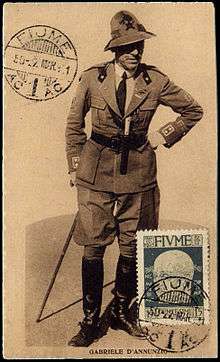Proto-fascism
Proto-fascism refers to the direct predecessor ideologies and cultural movements that influenced and formed the basis of fascism.[1][2] A prominent proto-fascist figure is Gabriele D'Annunzio, the Italian nationalist whose politics influenced Benito Mussolini and Italian Fascism.[1] Proto-fascist political movements include the Italian Nationalist Association (Associazione Nazionalista Italiana, ANI), the German National Association of Commercial Employees (Deutschnationaler Handlungsgehilfen-Verband, DHV) and the German National People's Party (Deutschnationale Volkspartei, DNVP).[2]

Precedents for modern fascism can be seen in the cultures and governments of older nations which were heavily based on a desire to maintain law and order, such as the Roman Empire and the anciens régimes of Europe.
Other people who have been labeled proto-fascist because they shared an ideological basis with fascism include:
- Thomas Carlyle (1795–1881)[3]
- Goldwin Smith (1823–1910)[4]
- Charles Maurras (1868–1952)
- Ion Dragoumis (1878–1920)[5][6]
- Patrick Pearse (1879–1916)[7]
- Edgar Julius Jung (1894–1934)
- D. H. Lawrence (1885–1930). The English philosopher Bertrand Russell reportedly characterized Lawrence as a "proto-German fascist"[8]. This complex characterization is useful as a demarcation point between Fascism and proto-fascism. The former has totalitarian uniformity as its paradigm, but Russell is referring to Lawrence as a "nonconformist prophet" struggling with individual alienation, looking to the shared identity of ancestral blood and soil for reconnection i.e. an evolution of the German 19th-century Völkisch movement.[9][10]
References
- Spackman, Barbara: Fascist Virilities: Rhetoric, Ideology, and Social Fantasy in Italy, p. 78.
- Peter Davies, Derek Lynch. The Routledge Companion to Fascism and the Far Right London, England, UK; New York, New York, USA: Routledge. p. 94.
- Ulrich Broich, H. T. Dickinson, Eckhart Hellmuth, Martin Schmidt: Reactions to Revolutions: The 1790s and Their Aftermath, p. 255
- Kenneth Lunn & Richard C. Thurlow: British Fascism: Essays on the Radical Right in Inter-War Britain, p. 27, 32.
- John Mazis, A Man For All Seasons: The Uncompromising Life of Ion Dragoumis
- "Γιάννης Μάζης: «Ο Δραγούμης δεν έχω καμία αμφιβολία ότι ήταν ένας πρωτοφασίστας»". Εθνικόν Κράτος (in Greek). 2017-06-04. Retrieved 2018-10-23.
- "Patrick Pearse: proto-fascist eccentric or visionary?". History Ireland (Podcast). Retrieved 2019-03-10.
- Krockel, Carl (2007). D H Lawrence and Germany: The politics of Influence. Amsterdam: Rodopi. p. 2. ISBN 978-90-420-2126-6.
- Ferretter, Luke. "A Prison for the Infinite": D. H. Lawrence and Bertrand Russell on the War.
- Kurlander, Eric (2002). "The Rise of Völkisch-Nationalism and the Decline of German Liberalism: A Comparison of Liberal Political Cultures in Schleswig-Holstein and Silesia 1912-1924". European Review of History: Revue européenne d'histoire. 9 (1): 23–36. doi:10.1080/13507480120116182. ISSN 1350-7486.
Sources
- Griffin, Roger (2006). The Nature of Fascism. Routledge. ISBN 9781136145889.CS1 maint: ref=harv (link)